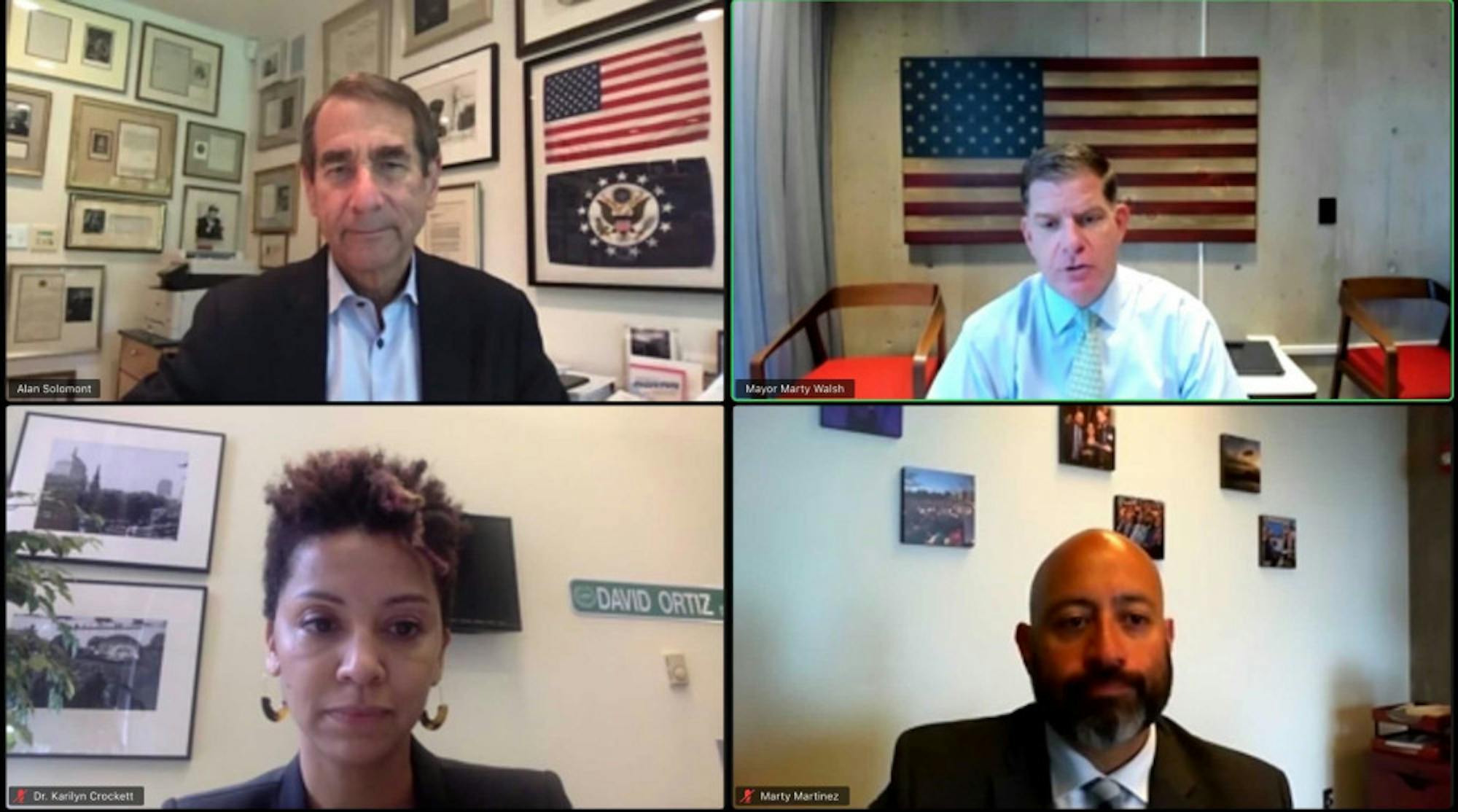The Jonathan M. Tisch College of Civic Life hosted a discussion with Boston Mayor Marty Walsh and city leaders Dr. Karilyn Crockett, chief of equity, and Marty Martinez, chief of health and human services. The event was held Wednesday as part of Tisch College’s Civic Life Lunch series and was moderated by Dean of Tisch College Alan Solomont.
Solomont first asked Walsh about his response to the COVID-19 pandemic.
Walsh explained that when Boston saw its first case of coronavirus at the University of Massachusetts Amherst, officials were faced with immediate decisions.
“February 2 was the first case of coronavirus in Boston ... March 6 was the sixth case,” Walsh said. “We were faced with decisions like closing schools, school buildings, canceling the St. Patrick's Day Parade ... [and] postponing the [Boston] marathon.”
He emphasized city officials’ adherence to science-based protocols to prevent the spread of the virus and their determination to take immediate action.
“It was important that we listened to the science and it was important that we took action because lives were at stake,” Walsh said.
Solomont then asked Walsh about the role of the national government and state governments during a global health crisis.
“You have the national government that helps and works down to the states which works down to the cities and town ... whether it's creating systems for giving ventilators out or equipment or giving us information alone," he said.
Walsh criticized the national government's response to the pandemic.
"In this particular case with COVID-19, that did not happen ... there was a major fundamental breakdown in the national government,” he said.
Solomont later directed questions at Martinez and asked him about how the city is protecting communities of color, which have been disproportionately affected by the pandemic.
Martinez cited a task force Walsh created in an effort to address health inequities exacerbated by the crisis.
“[Task force members] represent and reflect the diversity of Boston ... they are working with us in partnership to understand: What does the data tell us? Where [are] the disparities?” he said.
Martinez indicated that city officials have seen a rise in COVID-19 cases among Latinos in the past few months.
“I’m in those communities and what we’ve really tried to do is be very transparent about data ... about what we see and be clear we need to roll up our sleeves and solve this together,” Martinez said.
Solomont returned to questions for Walsh and asked him about city leaders’ efforts to reduce racial inequities.
Walsh recalled a study that underlined gaps in earned wealth between different racial groups.
“We have to do better to create opportunities for people to be able to move into the middle class,” he said.
Crockett, who leads the city’s racial equity fund, echoed Walsh’s sentiments and advocated for structural change.
“We are in the midst of a structural crisis as much as we are in the midst of a public health crisis ... what it takes to address a structural crisis is structural change,” she said.
Crockett also emphasized the importance of having the support of academic institutions, like Tufts, to implement positive change.
“We have some work to set a table and let people know what’s important, but we can’t do it alone, which is why it’s so important to have partners like Tufts and folks in the education world,” she said.
Solomont asked Crockett about her plan to address racism and racial inequalities as the city's chief of equity. She responded by outlining current societal structures.
“The real question here is climbing up anti-black racism and this larger structure of white supremacy that we’re situated in,” she said. “[The structure] will convince us that racial hierarchies are a normal and natural way to organize society, which we know is not the case.”
Crockett mentioned that such racial issues can be expansively found in history.
“The fact that you could assign someone’s worth, and their opportunity, based on melanin, or lack of, is ... the root of our society and the root of our nation, our history,” Crockett said. “It’s not about singling out a particular group of people, white or black, but it’s a system we’re all implicated in all of our structures.”
Solomont asked Walsh about the current political scene and his reaction to the presidential debate on Tuesday.
“I was embarrassed, in some ways, of the performance of how [President Donald Trump] conducted himself ... there is so much at stake right now in our country," he said.
The event ended with questions from the audience.
“I am a firm believer, when you’re governing as a leader, it’s a collaboration. It’s not lead from the top down,” Walsh said.






